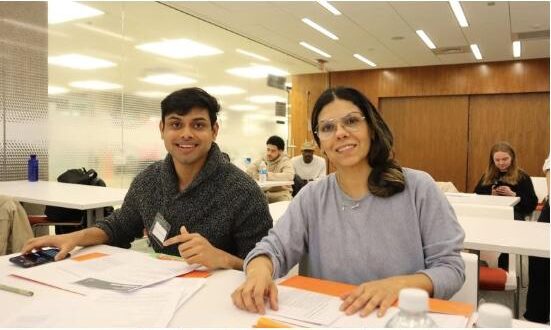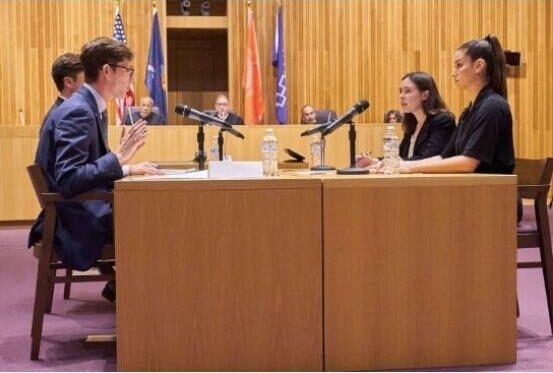Karla Lellis
RESEARCH
Research Statement
Advisor: Antonio Gidi
My research focuses on the intersection of class actions and cybersecurity, aiming to address the challenges faced by individuals impacted by data breaches in the digital era. How can class actions effectively protect the rights of individuals affected by cyber incidents? What are the critical factors in calculating damages in cybersecurity class actions?
I employ a multidisciplinary approach to answer these questions, integrating legal analysis, empirical research, and case studies. By examining existing legal frameworks and analyzing precedent-setting cases, I aim to identify best practices for utilizing class actions to seek compensation for the harm suffered by individuals in data breach incidents. Additionally, I will explore the complexities surrounding calculating damages in cybersecurity cases, including quantifying intangible harms.
The potential impact of my research is significant. By providing insights into the effectiveness of class actions in addressing cyber incidents, my work can contribute to developing more robust legal frameworks and improved mechanisms for protecting individuals in the digital realm. Furthermore, understanding the challenges associated with calculating damages in cybersecurity class actions can inform policymakers, legal practitioners, and scholars, enhancing their ability to seek just and fair remedies for affected individuals.
My research aims to bridge the gap between legal theory and practical solutions, fostering a more secure and equitable digital environment. Ultimately, I aspire to contribute to the ongoing efforts to strengthen cybersecurity laws, protect individual rights, and ensure justice for those impacted by cyber incidents.

Research Skills
I have developed robust research skills and technical expertise in cybersecurity and data privacy, complemented by my academic pursuits and professional experience. These skills enable me to conduct rigorous and impactful research that addresses complex issues and contributes to advancing knowledge in the field.
Data Analysis
I am proficient in various data analysis methods and techniques, including quantitative analysis, statistical modeling,
and data visualization.
Laboratory Techniques
While my research primarily focuses on legal and policy aspects of cybersecurity, I understand relevant laboratory techniques used in the field. This includes knowledge of cybersecurity testing methodologies, network analysis, and vulnerability assessment.
Software Tools
Over the past year, I have gained valuable experience working with compliance software in the industry. This has provided me with hands-on expertise in using software tools for compliance management, risk assessment, and data privacy compliance.
Research in Cybersecurity Class Actions
I have focused on cybersecurity class actions, examining the legal and practical aspects of seeking compensation for individuals impacted by data breaches. This research has equipped me with a comprehensive understanding of the challenges and opportunities within this domain.
Research Skills
I have developed robust research skills and technical expertise in cybersecurity and data privacy, complemented by my academic pursuits and professional experience. These skills enable me to conduct rigorous and impactful research that addresses complex issues and contributes to advancing knowledge in the field.
Data Analysis
I am proficient in various data analysis methods and techniques, including quantitative analysis, statistical modeling,
and data visualization.
Laboratory Techniques
While my research primarily focuses on legal and policy aspects of cybersecurity, I understand relevant laboratory techniques used in the field. This includes knowledge of cybersecurity testing methodologies, network analysis, and vulnerability assessment.
Software Tools
Over the past year, I have gained valuable experience working with compliance software in the industry. This has provided me with hands-on expertise in using software tools for compliance management, risk assessment, and data privacy compliance.
Research in Cybersecurity Class Actions
I have focused on cybersecurity class actions, examining the legal and practical aspects of seeking compensation for individuals impacted by data breaches. This research has equipped me with a comprehensive understanding of the challenges and opportunities within this domain.

Impact and Contributions
Overall, my research skills, combined with my technical expertise in data analysis, laboratory techniques, programming languages, and software tools, position me well to undertake in-depth investigations, analyze complex datasets, and contribute to advancing knowledge in cybersecurity and data privacy.
The impact and contributions of my research in cybersecurity class actions are multi-faceted and far-reaching. My work seeks to address the legal and practical challenges faced by individuals affected by data breaches while also making significant contributions to the field and society.
One of the critical contributions of my research is the establishment of legal precedents and guidelines for cybersecurity class actions. Through thorough analysis of case law, statutory provisions, and emerging trends, I aim to develop a comprehensive understanding of the legal landscape surrounding data breaches and class action lawsuits. This knowledge can guide individuals, legal practitioners, and organizations involved in these cases, facilitating their ability to navigate complex legal scenarios and advocate for their rights.
By engaging in interdisciplinary initiatives and leveraging insights from cybersecurity, law, and data science, I aim to create a holistic approach to addressing the challenges of cybersecurity class actions. Additionally, my research has the potential to foster collaborations and partnerships among various stakeholders, including individuals, companies, and legal experts. This collaborative approach can contribute to developing more effective and efficient mechanisms for compensating individuals impacted by data breaches while promoting a data protection and security culture.
My work creates a more equitable and secure digital environment by establishing legal frameworks and advocating for individual rights. Regarding societal impact, my research empowers individuals by providing avenues for seeking redress and compensation for the harm caused by data breaches. It also raises awareness about the importance of data privacy and cybersecurity, encouraging individuals and organizations to protect sensitive information proactively.
Moreover, my research has implications for companies and the U.S. government. By offering insights into legal obligations, risk management, and regulatory frameworks related to cybersecurity class actions, my work helps companies enhance their data protection strategies and mitigate the risks associated with data breaches. It also informs policymakers and government agencies, enabling them to develop more robust cybersecurity regulations and policies that promote accountability, incentivize best practices, and facilitate swift responses to data breaches.
My research in cybersecurity class actions aims to make meaningful contributions to the field and society by advancing legal understanding, fostering collaboration, empowering individuals, and promoting a resilient and secure digital ecosystem. I strive to create a positive impact that benefits individuals, companies, and the broader community by addressing the challenges in this rapidly evolving landscape.

Karla served as a judge for the 2024 Hult Prize, where young innovators showcased inspiring solutions to the world’s most pressing challenges through social entrepreneurship.
The Hult Prize empowers the next generation of changemakers to create lasting impact. The finalists presented groundbreaking ideas addressing critical issues like climate change, poverty, and inequality.
“I was amazed by the creativity, passion, and dedication of these young entrepreneurs. Their innovative business models aimed to generate profits while creating meaningful social and environmental change.”
The Hult Prize reminds us that when we harness the brilliance of young minds, we can unlock the potential to build a more sustainable and equitable world.

Karla served as a judge at the 2024 Transatlantic Negotiation Competition(TNC). The competition was truly global, with 35 rounds between 28 teams from six continents, 15 countries, and 15 time zones.
About the Transatlantic Negotiation Competition, the competition gives law students around the world an opportunity to hone their negotiation and communication skills in a transnational setting, with particular emphasis on the importance of cross-cultural negotiation and communication in resolving disputes and facilitating client agreements.
It was an honor for Syracuse Law School and Queen’s University Belfast to host the competition, and we hope it was a worthwhile learning experience.
Future Directions
In my future research endeavors, I plan to continue exploring the field of cybersecurity class actions with a focus on advancing our understanding and addressing emerging challenges. Building upon the foundation of my current research, I aim to delve deeper into several key areas and pursue new avenues of inquiry.
One of the future directions of my research is to investigate the evolving landscape of data breaches and their impact on individuals and organizations. I intend to analyze emerging trends, technological advancements, and legal developments to comprehend the changing nature of cybersecurity threats better. By staying abreast of the latest developments in this dynamic field, I aim to identify potential gaps in legal frameworks and propose innovative solutions that adapt to the evolving nature of cyber threats.
Additionally, I plan to explore the intersection of cybersecurity class actions with other areas of law, such as privacy regulations and consumer protection. By examining the interplay between these legal domains, I seek to develop a comprehensive understanding of the broader legal landscape that impacts individuals affected by data breaches. This multidisciplinary approach will allow me to propose integrated legal frameworks that provide holistic protection and redress for individuals affected by cybersecurity incidents.
By conducting empirical studies and engaging in industry collaborations, I aim to identify and promote proactive measures organizations can adopt to enhance their cybersecurity posture. This includes assessing the effectiveness of incident response plans, evaluating breach notification procedures, and advocating for more robust data protection practices.
Furthermore, I aspire to contribute to developing the best rules and guidelines for companies to prevent and respond to data breaches effectively.
In parallel, I plan to explore the ethical dimensions of cybersecurity class actions and their implications for individuals’ privacy and civil liberties. This involves examining the balance between the rights of individuals seeking compensation and the potential impact on the broader digital ecosystem. By addressing ethical considerations, I propose frameworks that provide redress and uphold principles of fairness, transparency, and responsible data governance.
Lastly, I am committed to disseminating my research findings and engaging in knowledge-sharing initiatives. This includes publishing scholarly articles, presenting at conferences, and actively participating in academic and professional communities. By sharing insights and collaborating with other researchers and practitioners, I aim to foster a collective effort in advancing the field of cybersecurity class actions and promoting a more secure and equitable digital landscape.
My future research goals and aspirations center around deepening our understanding of cybersecurity class actions, proposing innovative solutions, and driving positive change in the field. By exploring new avenues, engaging in interdisciplinary collaborations, and addressing emerging challenges, I aim to make a lasting impact on legal frameworks, industry practices, and individuals’ rights in the realm of cybersecurity class actions.